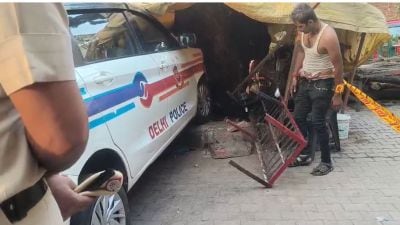Death ends father’s wait for Yunus
Yunus would have also returned,’’ that’s what a disturbed Khwaja Ayub said to his family a few days ago when his son’s f...

Yunus would have also returned,’’ that’s what a disturbed Khwaja Ayub said to his family a few days ago when his son’s friend and a co-accused in the Ghatkopar bomb blasts case, Zaheer Sheikh, received bail on grounds that the evidence against him was very flimsy.
For a year and three months, Ayub had lived in the hope that someday he would know the fate of his son who went missing from police custody a few weeks after being picked up on suspicion. Although Assistant Inspector and encounter expert Sachin Vaze has been arrested and booked for Yunus’ murder, circumstances surrounding the incident are still hazy.
And now, Ayub will never know the truth. The 63-year-old former food inspector from Parbhani passed away early on Sunday morning following a massive heart attack.
‘‘He had been very disturbed since he heard that Zaheer had been granted bail. He kept saying Yunus too would have been set free,’’ Zeba, Ayub’s daughter-in-law, told The Indian Express over the telephone. ‘‘He was waiting to meet Zaheer and ask him about Yunus.’’
According to his family, Ayub complained of restlessness around 2.30 am on Saturday. He was rushed to Parbhani Civil Hospital where he breathed his last at 3 am.
The funeral took place at Parbhani on Sunday noon, with nearly 2,000 people, including local politicians, attending. The family had almost been ostracised after Yunus was arrested in December 2002 for the Mumbai blasts. ‘‘People would simply avoid us,’’ Zeba whispered. ‘‘But slowly they too had begun believing that Yunus was innocent. Today, there was no place for people to even stand.’’
Twenty-seven-year-old Khwaja Yunus, Ayub’s younger son, went missing from custody weeks after he was arrested with three others including Zaheer Sheikh. Police claimed he had escaped when a vehicle carrying him to Aurangabad overturned.
But his family, convinced he had been killed in custody, filed a habeas corpus plea. The testimony of a co-accused, Abdul Mateen, who said he had seen Yunus throw up blood in prison fuelled suspicion. Despite failing health, Ayub had publicised his crusade through the courts and the media for well over a year, making the trip to Mumbai from Parbhani for every hearing.
In March, Ayub was admitted to a Parbhani Hospital for hypertension. ‘‘Baba pushed himself to the limits. And today when the case is gaining momentum, he is no more,’’ said his daughter-in-law. ‘‘
Photos





- 01
- 02
- 03
- 04
- 05


























